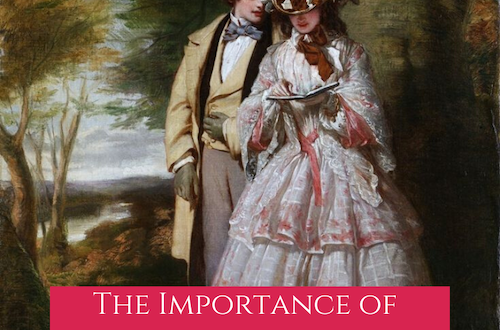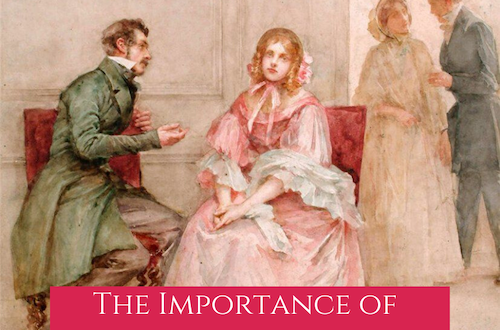
Episode 44: “The Importance of Being Earnest” Act 1
This week on The Literary Life podcast, our hosts dive into Act 1 of Oscar Wilde’s satirical play The Importance of Being Earnest. Angelina, Cindy and Thomas share their commonplace quotes, which leads into a conversation on education before they begin talking about the play. Thomas talks about the name of the play as well as the name “Ernest” in context of this time period. Angelina highlights her excitement of noticing the connection between Wilde’s humor and P. G. Wodehouse. Angelina talks about the changing roles of social classes in the late Victorian age and how that comes into this story. Our hosts go through this first act and discuss the social conventions at which Wilde is poking fun.
Listen to The Literary Life:
Commonplace Quotes:
We find that the mind is better fed by digesting a page than by devouring a volume.
Thomas Macaulay
Education is an admirable thing. But it is well to remember from time to time that nothing that is worth knowing can be taught.
Oscar Wilde
The greatest thing a human soul ever does in this world is to see something and tell what it saw in a plain way. Hundreds of people can talk for one who can think, but thousands can think for one who can see. To see clearly is poetry, prophecy and religion, all in one.
John Ruskin
Kew Gardens
by D. M. Black
(in memory of Ian Armstrong Black, d. 1971)
Distinguished scientist, to whom I greatly defer
(old man, moreover, whom I dearly love),
I walk today in Kew Gardens, in sunlight the colour of honey
which flows from the cold autumnal blue of the heavens to light these tans and golds,
these ripe corn and leather and sunset colours of the East Asian liriodendrons,
of the beeches and maples and plum-trees and the stubborn green banks of
the holly hedges –
and you walk always beside me, you with your knowledge of names
and your clairvoyant gaze, in what for me is sheer panorama
seeing the net or web of connectedness. But today it is I who speak
(and you are long dead, but it is to you I say it):
‘The leaves are green in summer because of chlorophyll
and the flowers are bright to lure the pollinators,
and without remainder (so you have often told me)
these marvellous things that shock the heart the head can account for.
But I want to sing an excess that is not so simply explainable,
to say that the beauty of the autumn is a redundant beauty,
that the sky had no need to be this particular shade of blue,
nor the maple to die in flames of this particular yellow,
nor the heart to respond with an ecstasy that does not beget children.
I want to say that I do not believe your science
although I believe every word of it, and intend to understand it;
that although I rate that unwavering gaze higher than almost everything,
there is another sense, a hearing, to which I more deeply attend.
Thus I withstand and contradict you, I, your child,
who have inherited from you the passion that causes me to oppose you.’
Book List:
The Lays of Ancient Rome by Thomas Macaulay
The Modern Painters, Vol. 3 by John Ruskin
Till We Have Faces by C. S. Lewis
“A Few Maxims for the Instruction of the Over-Educated” by Oscar Wilde
Hard Times by Charles Dickens
The Buccaneers by Edith Wharton
The Allegory of Love by C. S. Lewis
Support The Literary Life:
Become a patron of The Literary Life podcast as part of the “Friends and Fellows Community” on Patreon, and get some amazing bonus content! Thanks for your support!
Connect with Us:
You can find Angelina and Thomas at HouseofHumaneLetters.com, on Instagram @angelinastanford, and on Facebook at https://www.facebook.com/ANGStanford/
Find Cindy at https://cindyrollins.net, on Instagram @cindyordoamoris and on Facebook at https://www.facebook.com/cindyrollins.net/. Check out Cindy’s own Patreon page also!
Follow The Literary Life on Instagram, and jump into our private Facebook group, The Literary Life Discussion Group, and let’s get the book talk going! http://bit.ly/literarylifeFB
Subscribe to The Lit Life:








